Baba Ghanouj/ Baba Ghanoush/ Moutabal
A classic Middle Eastern roasted eggplant spread flavored with tahini (sesame paste), lemon juice, and garlic – drizzled with olive oil and served with pita bread. A staple starter, typically served with hummus, tabbouleh, fattoush, sfeeha and other Middle Eastern meze selection! It makes as well a great party dip- and a perfect accompaniment to grilled or fried fish. Known in the west as “Baba Ghanouj”, but if you need to order it in a restaurant in Lebanon or the Middle East, you need to know that it is called “Moutabal”, otherwise you will be served a roasted eggplant dip with no tahini. So just a fair waring to know what you are ordering!
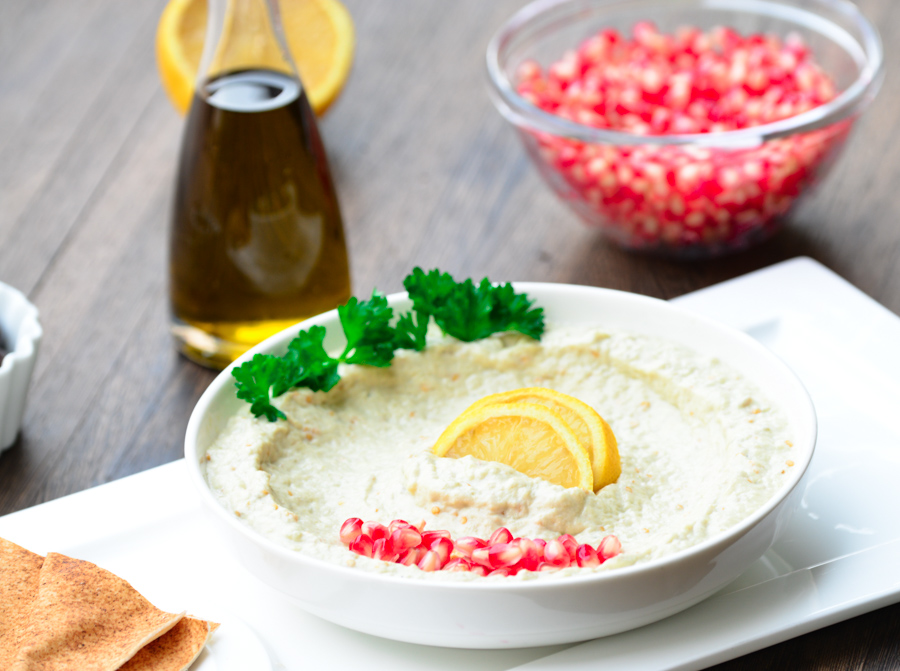
The frequently asked question: “Hummus or Baba Ghanouj”? Now this is hard if not impossible to answer. I like both equally and would happily enjoy them as part of the Lebanese mezze spread; but to make it easier, the rule of thumb is that “Hummus” goes so well with red meat dishes, while “Baba Ghanoush” is a perfect accompaniment to baked or fried fish!
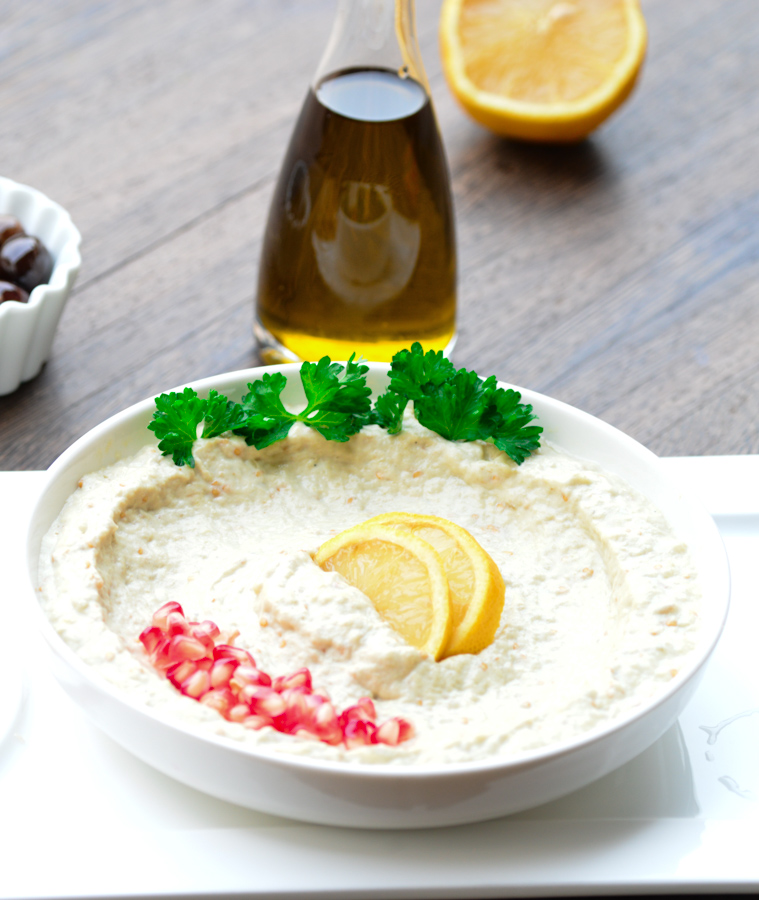
You have three ways to roast the eggplants. Either on the stovetop, directly on coals or in the oven. When the warmer weather hits, and I have more time, I grill the eggplants on a charcoal grill for a more smoky flavor. Roasting on an open flame yields the baba ghanouj an intense zip of smoky, favorable taste.
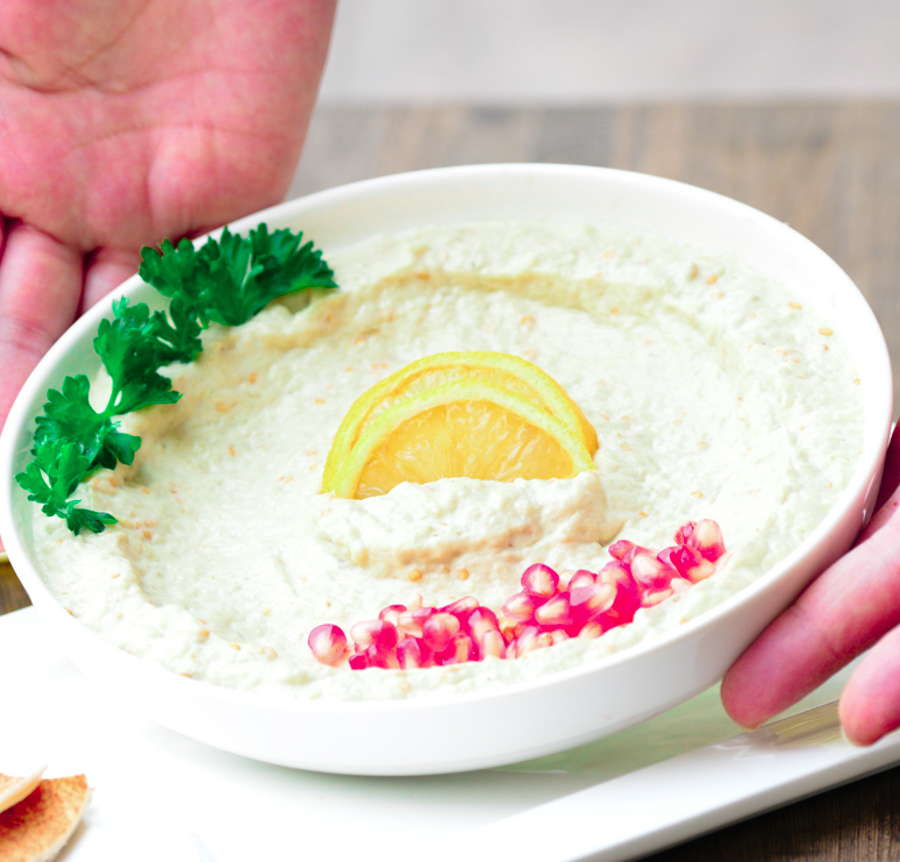
How to keep your baba ghanouj light in color, just like the ones in the restaurants in Beirut.
After lots of recipe sampling to achieve the desired white-pale baba ghanouj, just like the ones in the restaurants in Beirut, I figured out the following:
- Try to put your hands on the eggplants with shiny smooth skin that has no blemishes; besides try to use the seedless eggplants or the ones with fewer seeds – usually the ones with less seeds weigh less .
- Never prick the eggplants for roasting, just leave them unharmed to keep a good bright color.
- Another important tip is not to overcook the eggplants, overcooking will blacken their flesh, which will negatively affect the color and taste of baba ghanouj!
- A crucial issue is the tahini, not all brands are treated equally, if you need a rich baba ghanouj, use good-quality tahini.
- Use freshly squeezed lemon juice, and never use the ready bottled ones in the market..
- Olive oil and Middle Eastern dips are a match made in food heaven. Try to use the best olive oil to drizzle over your baba ghanouj.
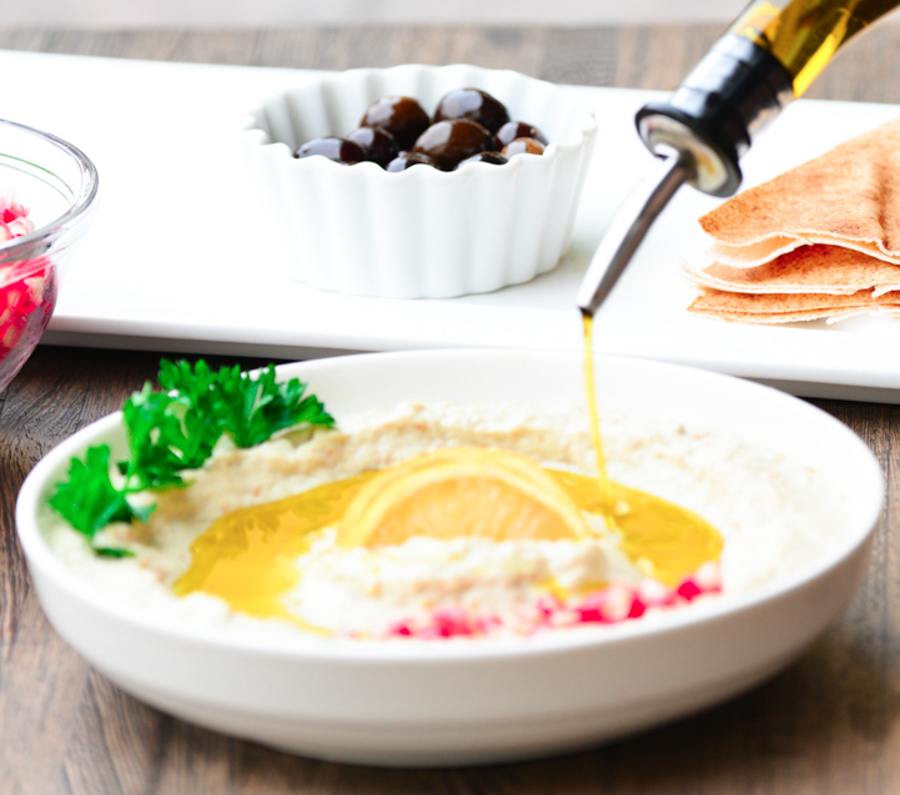
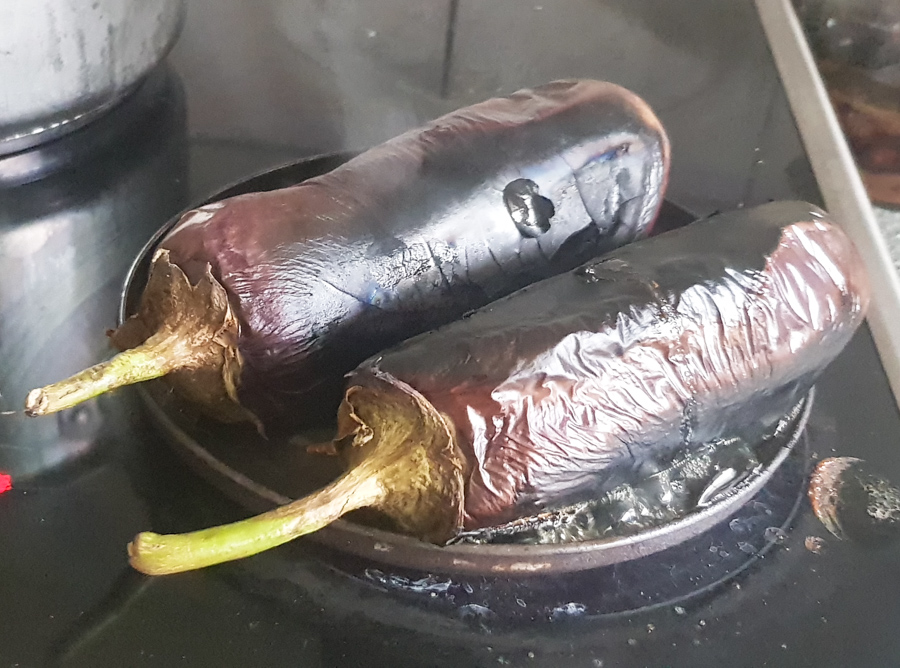
Roasting on the stovetop
When the warmer weather hits, and I have more time, I grill the eggplants on a charcoal grill for a more smoky flavor, but when making baba ghanouj indoors, the stovetop method is ideal; the open flame yields the baba ghanouj an intense zip of smoky silky taste. To keep your stovetop clean, place your eggplants on a large metal cookie tin, and roast them on the stovetop. Flip the eggplants over to ensure even roasting and cook no more than 10-12 minutes. It may drip some fluids while roasting and that’s totally OK. At this stage your eggplants should be like a burnt paper, but considerably soft. Set aside and wait for the eggplants to cool down. Peel the skin and let the eggplants rest in a strainer for a 2 minutes to get rid of the excess fluids. Scoop out the big visible seeds to avoid any bitter flavor, since the bitter flavor comes from the seeds. Place the peeled eggplants in a blender or a food processor. Add garlic, tahini, salt and lemon juice. Blend to your preferred consistency. You can even mash the eggplants with a fork for a more rustic, chunky “Baba Ghanouj”. Transfer the baba ghanouj to a serving plate; using a spoon, create a shallow well in the center and garnish with pomegranate seeds and parsley. Drizzle olive oil and serve with pita bread.
Roasting in the oven!
Roasting in the oven takes more time than the stovetop method, and yields a less smoky flavor than an open flame, definitely I prefer the stovetop version, but still it is doable, if you only have an oven. Place the eggplants on a baking sheet lined with aluminum foil, and roast in the oven at 230°C/ 450°F, turning from time to time until they soften and considerably shrink in size, it takes about 20-25 minutes. Remove from the oven and wait for the eggplants to cool down. Peel the skin and place the peeled eggplants in a blender. Add garlic, tahini, salt and lemon juice. Blend to your preferred consistency. Some prefer a chunkier consistency while others like a smooth paste. Transfer the baba ghanouj to a serving plate; using a spoon, create a shallow well in the center and garnish with pomegranate seeds and parsley. Drizzle olive oil and serve with pita bread.
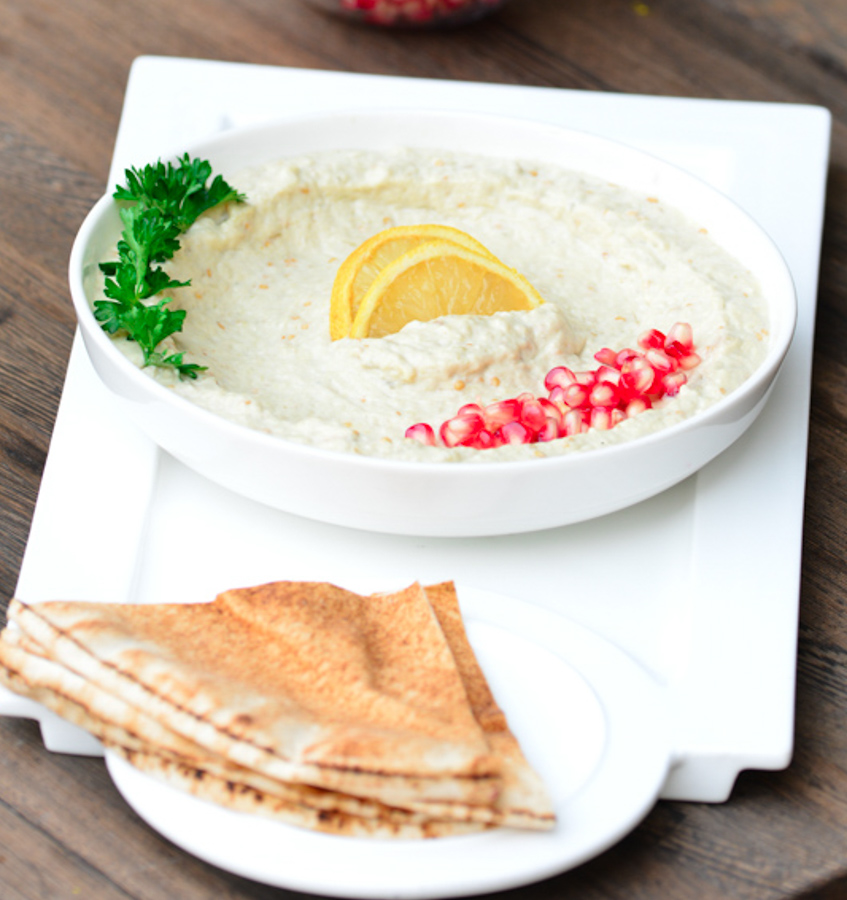
Make sure to use a good tahini brand, it makes all the difference! I would say use specifically Lebanese tahini, no bias here, just telling the truth! Shake well the tahini jar before using to homogenize the solids setting in the bottom of the jar.
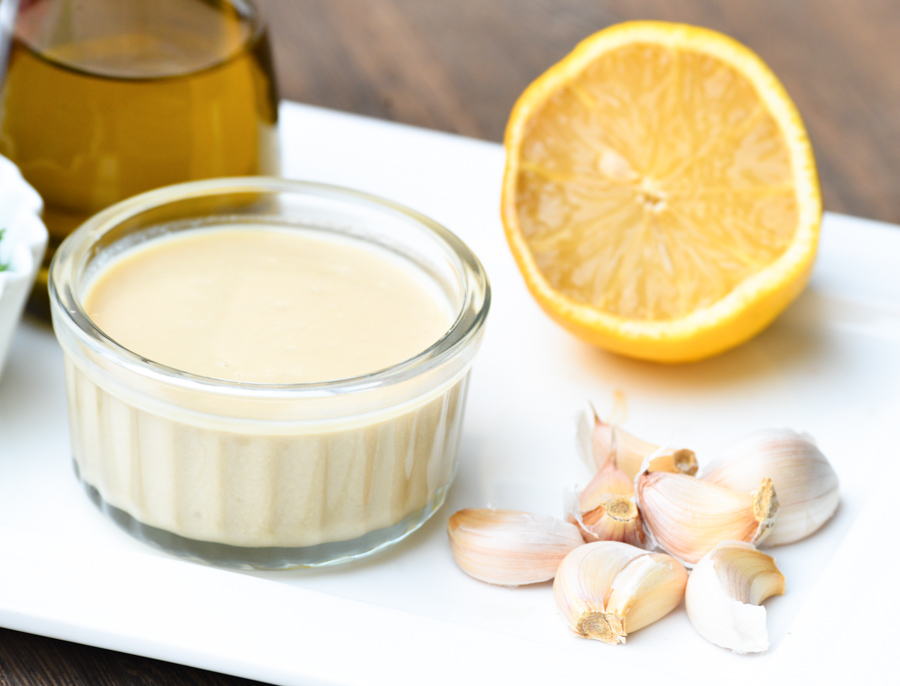
Use freshly squeezed lemon juice, and never use the ready store bottles
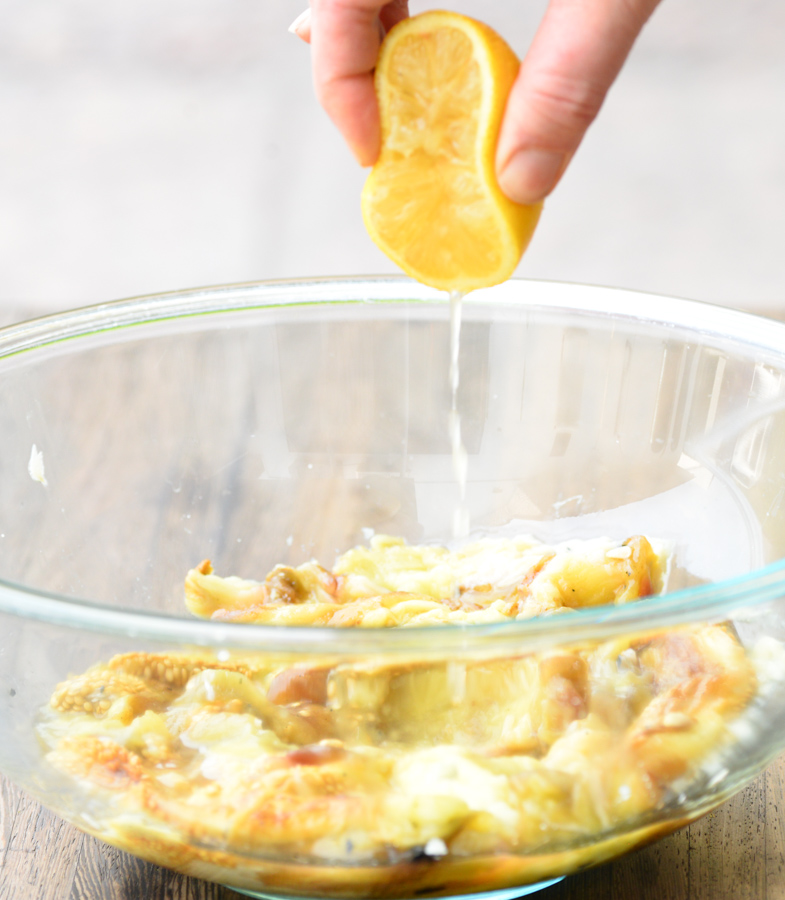
Garnishing with pomegranate seeds provides baba ghanouj with an attractive color, but it is really more than just a garnish. Adding pomegranate seeds will brighten the whole flavor profile of your baba ghanouj.
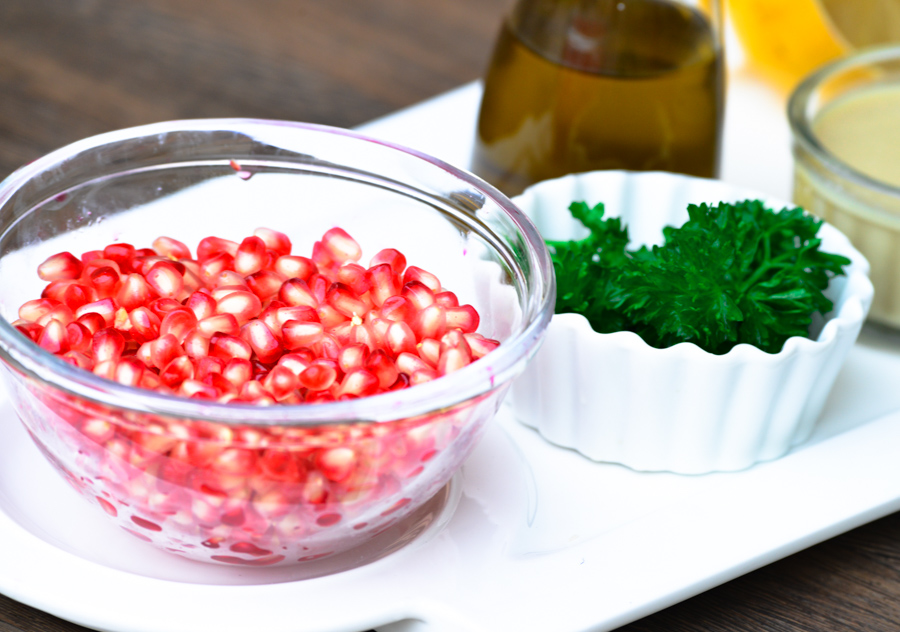
looking for the authentic Lebanese supreme hummus recipe, look no further
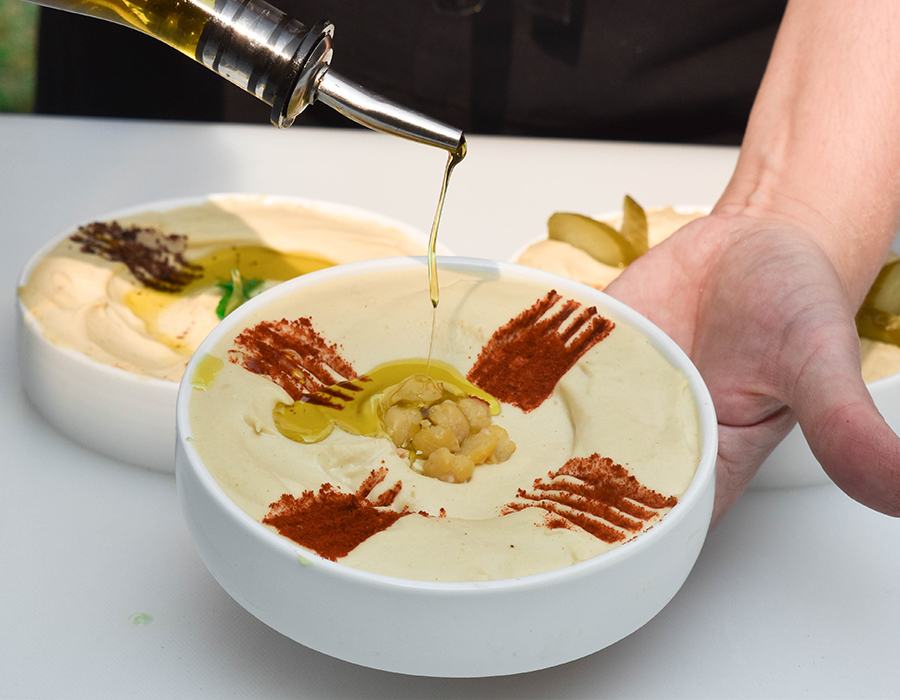
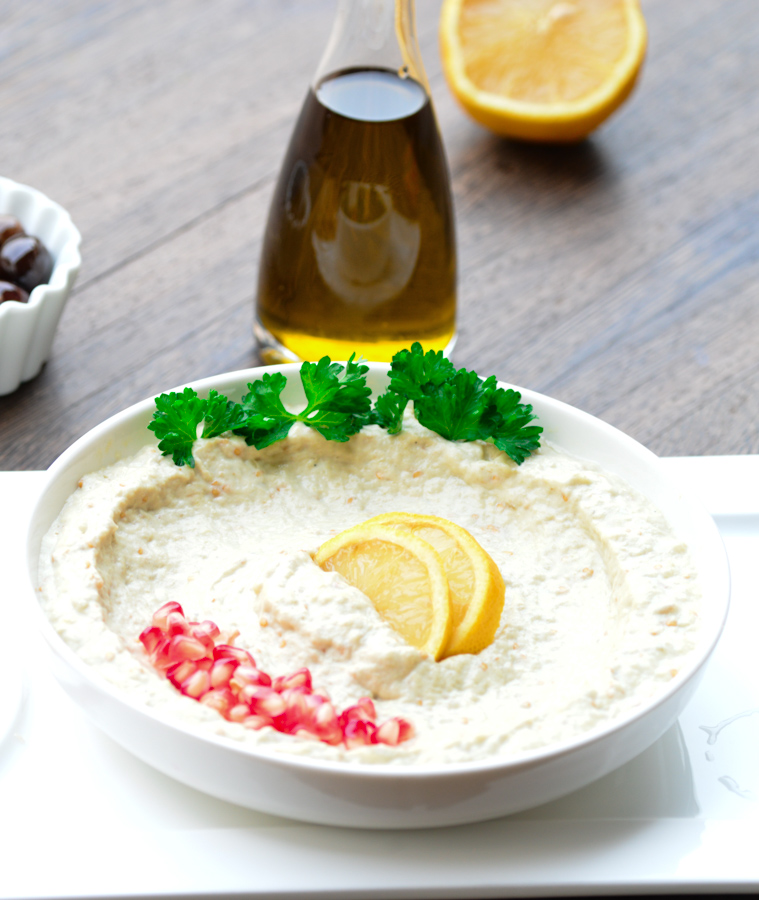
Baba Ghanouj/ Baba Ghanoush
Description
Ingredients
- 1 kg/ about 2 lb. large eggplants
- 1 teaspoon crushed garlic
- 1/2 cup tahini
- ¼ cup freshly squeezed lemon juice
- 1 teaspoon salt or to taste
- A handful of pomegranate seeds
- Parsley leaves for garnish, optional
Instructions
The Stovetop Option:
- Clean the eggplants and pat dry with a kitchen towel.
- To keep your stovetop clean, place your eggplants on a large metal cookie tin. Don’t prick the eggplants, and roast, making sure to turn them every now and then, until the eggplants are charred and considerably soft, just about 10-12 minutes.
- Remove from the heat and wait for the eggplants to cool down. Peel the skin and let the eggplants rest in a strainer for a 2 minutes to get rid of the excess fluids. Scoop out the big visible seeds to avoid any bitter flavor, since the bitter flavor comes from the seeds.
- Place the peeled eggplants in a blender or a food processor. Add garlic, tahini, salt and lemon juice. Blend to your preferred consistency. You can even mash the eggplants with a fork for a more rustic, chunky “Baba Ghanouj”.
- Transfer the baba ghanouj to a serving plate; using a spoon, create a shallow well in the center and garnish with pomegranate seeds and parsley. Drizzle olive oil and serve with pita bread.
- Leftovers will last in an airtight container, in the fridge, for 3-4 days.
The Oven Option:
- Clean the eggplants and pat dry with a kitchen towel.
- Place the eggplants on a baking sheet lined with aluminum foil and roast in the oven at 230°C/ 450°F, turning from time to time until they soften and considerably shrink in size, it takes about 20-25 minutes.
- Remove from the oven and wait for the eggplants to cool down. Peel the skin and let the eggplants rest in a strainer for a 2 minutes to get rid of the excess fluids. Scoop out the big visible seeds to avoid any bitter flavor, since the bitter flavor comes from the seeds.
- Place the peeled eggplants in a blender or a food processor. Add garlic, tahini, salt and lemon juice. Blend to your preferred consistency. Some prefer a chunkier consistency while others like a smooth paste. You can even mash the eggplants with a fork for a more rustic, chunky “Baba Ghanouj”.
- Transfer the baba ghanouj to a serving plate; using a spoon, create a shallow well in the center and garnish with pomegranate seeds and parsley. Drizzle olive oil and serve with pita bread.
- Leftovers will last in an airtight container, in the fridge, for 3-4 days.
Notes
If you make this recipe, leave a comment below or share your pictures on Facebook! I would love to see your creations!Hashtag them #Hadia's Lebanese Cuisine
The recipe for the “Baba Ghanouj” was posted on July 2014, the photos and text were updated on August, 2020!


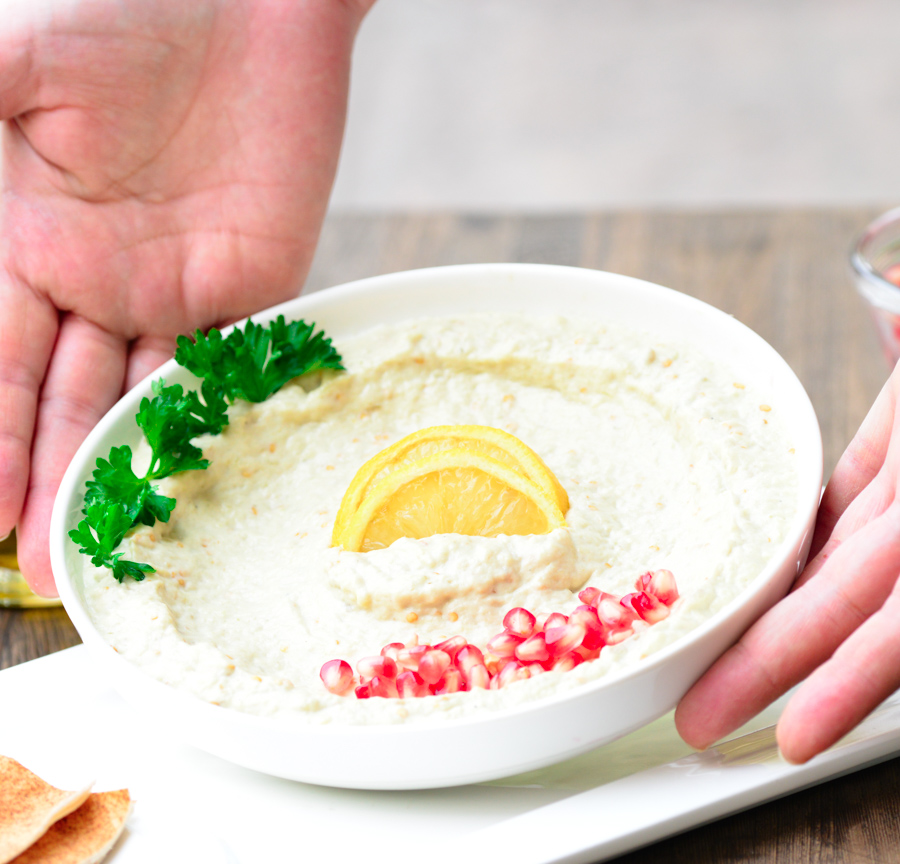
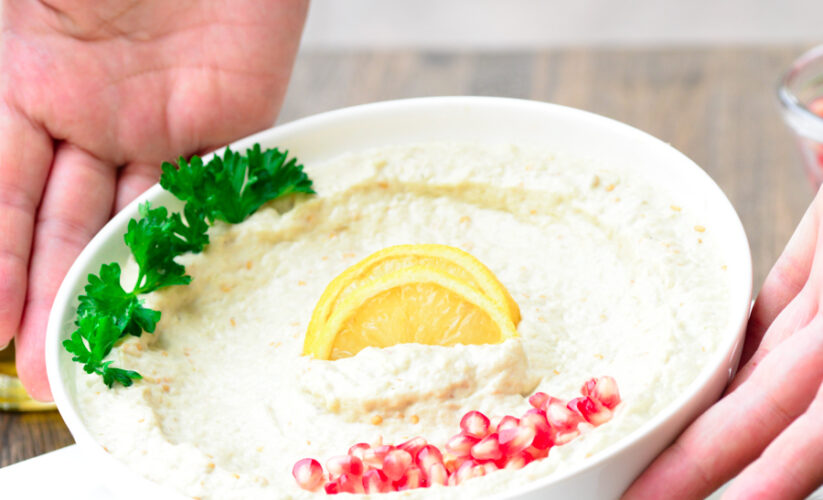
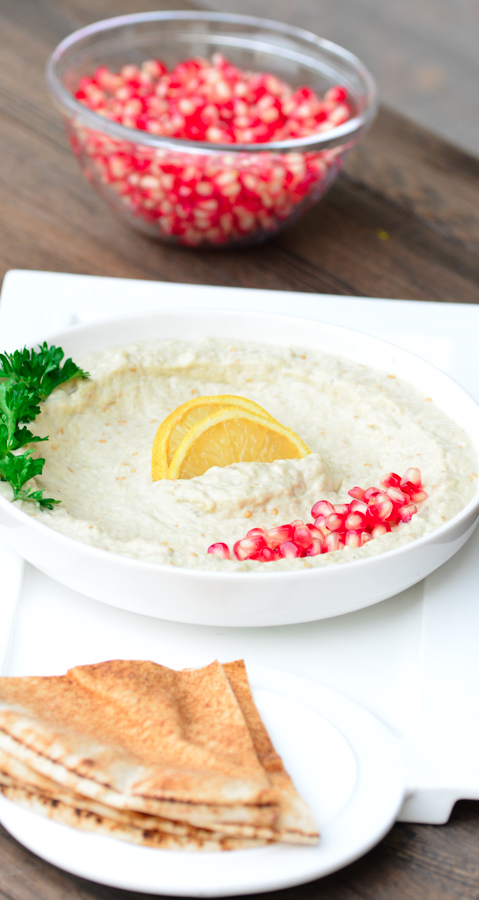
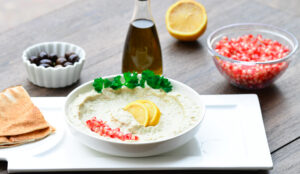
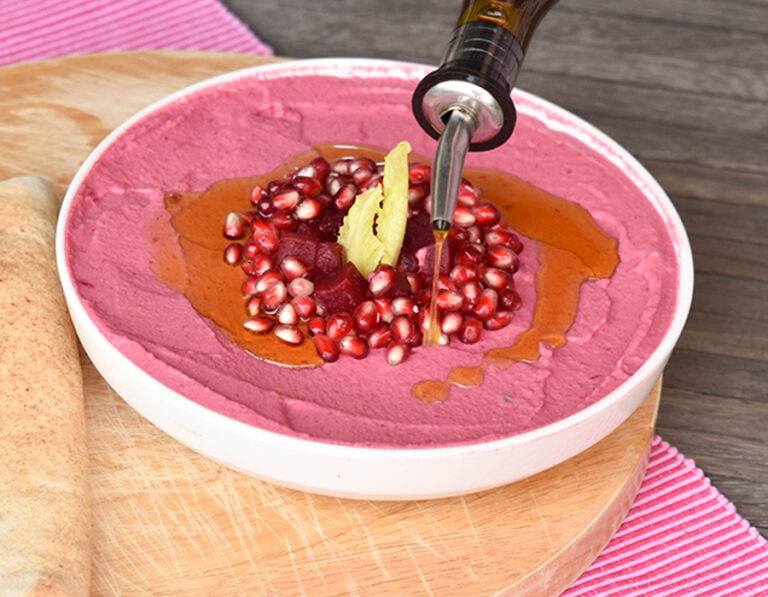
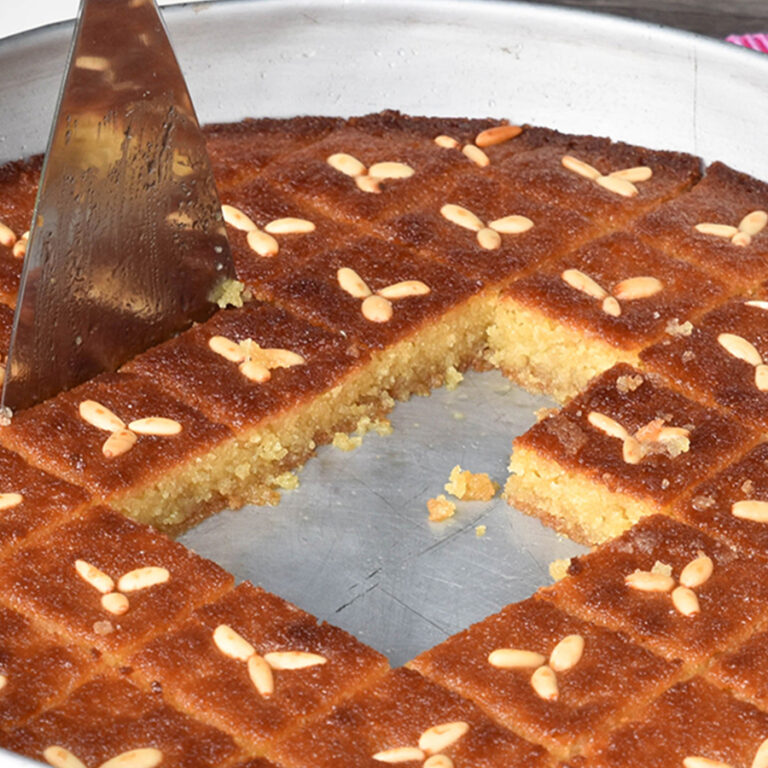
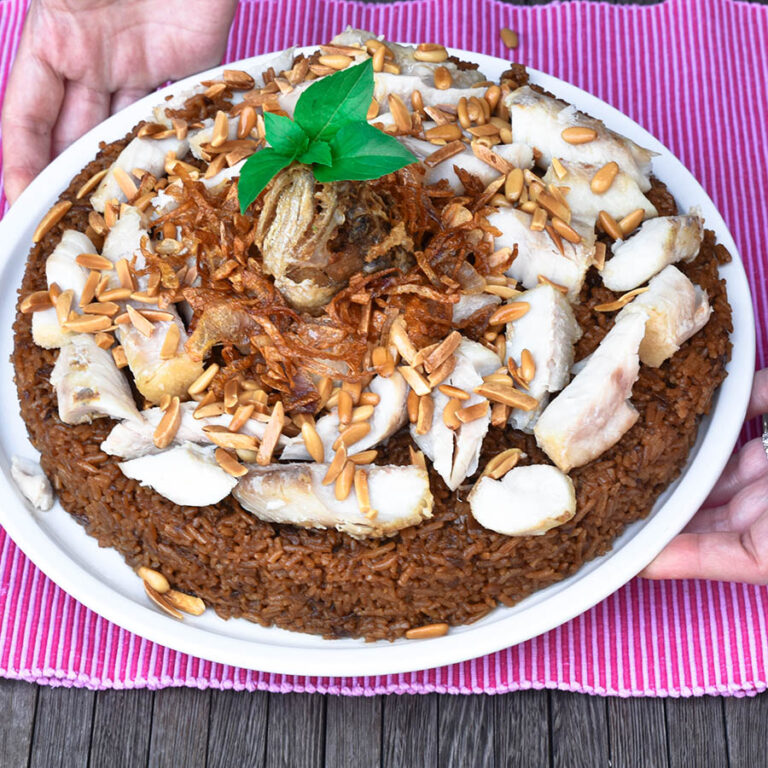
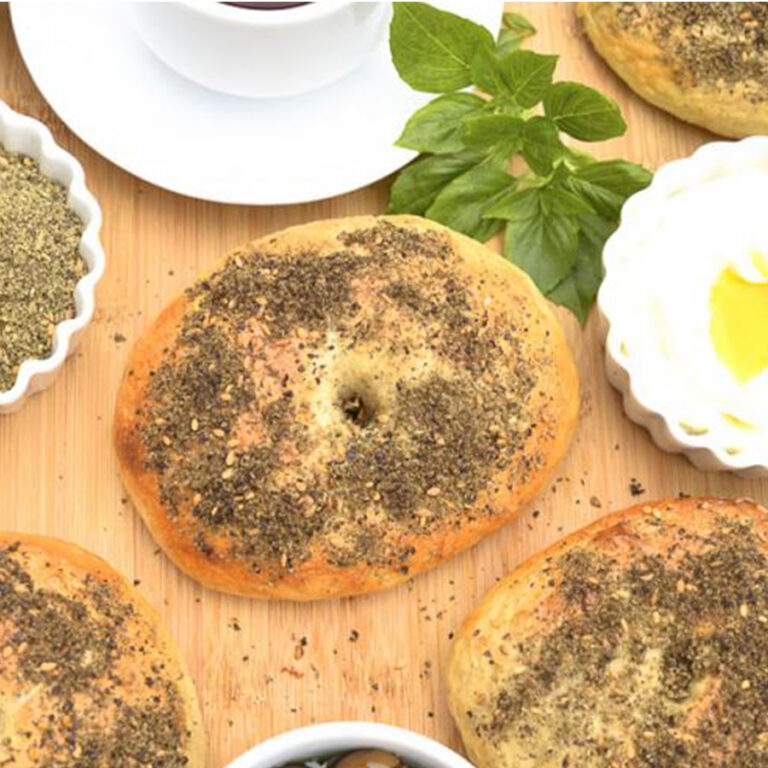

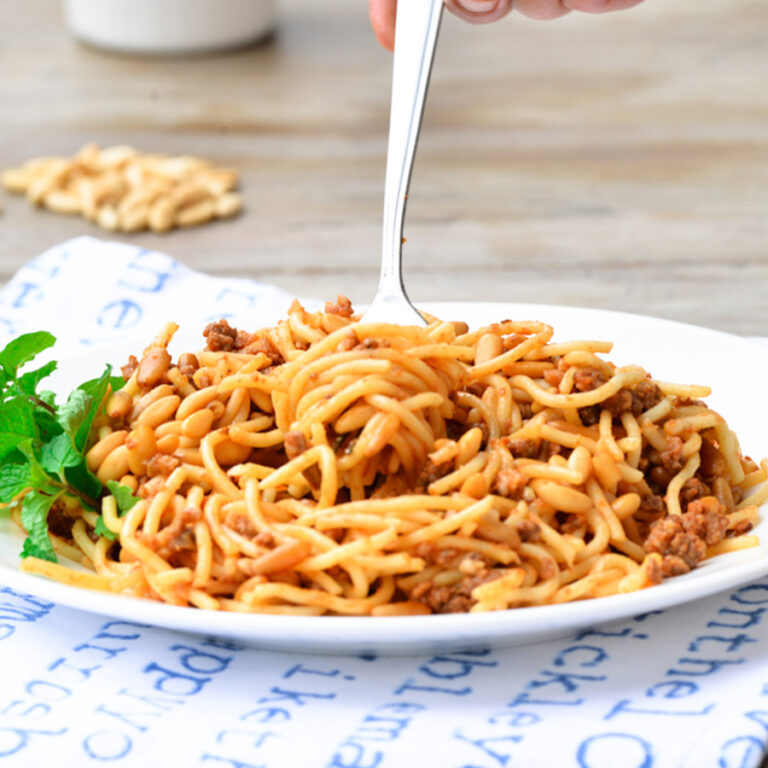
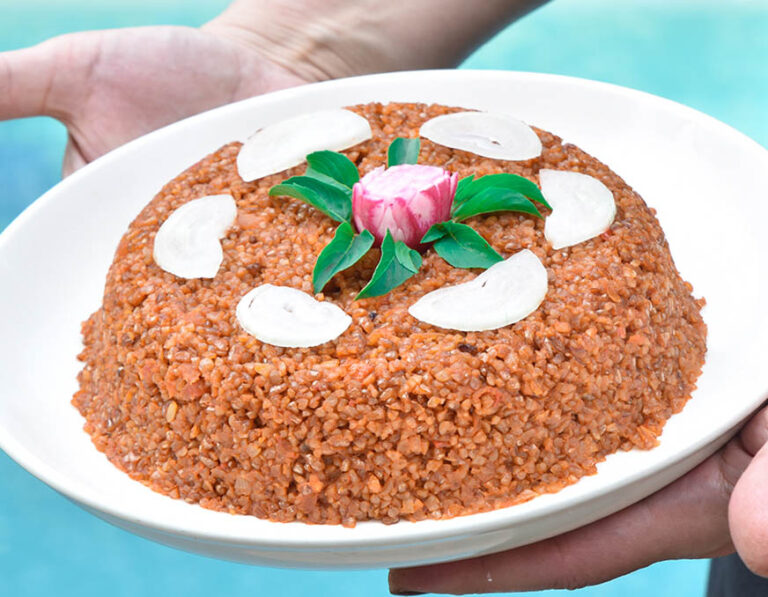
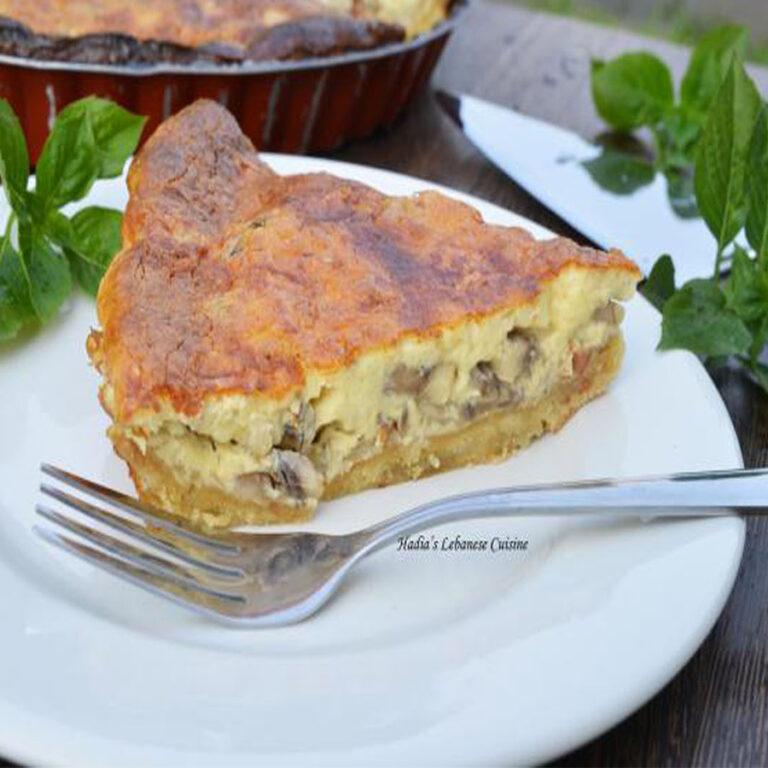




















2 Comments
This is the best baba ghanouj I’ve ever had. My boyfriend is from Beruit and he said it tastes just like what he would eat at a fancy restaurant back home. Thank you!
Thank you so much, Laure, for the feedback, much appreciated, xoxo.